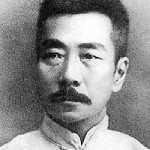 Lu Xun (1881-1936, Wade-Giles: Lu Hsun) was an influential Chinese novelist and essayist, active in the early 20th century. Born in Zhejiang, Lu received a military education in China and Japan, while studying Western and classical Chinese literature in his spare time. After the Xinhai Revolution he worked in education, both as an administrator and a lecturer at Beijing University, while also writing. Lu’s social and political criticisms were popular during the May Fourth Movement (1919), to the extent that some consider him a figurehead of the movement. In 1927 Lu moved to Shanghai and formed a left wing writers’ guild, though he drifted away from this group after it was infiltrated by political propagandists. Lu’s stories, essays and critical works embraced new literary styles that proved more accessible to modern Chinese readers. Politically Lu was scathing about the failures of the early republic and the Guomindang government. His personal politics were left of centre and therefore closer to the growing Chinese Communist Party (CCP), though he never joined the party. During the 1960s CCP propagandists heaped praise on Lu’s contribution to Chinese culture and party ideology, while at the same time suppressing some of his writing.
Lu Xun (1881-1936, Wade-Giles: Lu Hsun) was an influential Chinese novelist and essayist, active in the early 20th century. Born in Zhejiang, Lu received a military education in China and Japan, while studying Western and classical Chinese literature in his spare time. After the Xinhai Revolution he worked in education, both as an administrator and a lecturer at Beijing University, while also writing. Lu’s social and political criticisms were popular during the May Fourth Movement (1919), to the extent that some consider him a figurehead of the movement. In 1927 Lu moved to Shanghai and formed a left wing writers’ guild, though he drifted away from this group after it was infiltrated by political propagandists. Lu’s stories, essays and critical works embraced new literary styles that proved more accessible to modern Chinese readers. Politically Lu was scathing about the failures of the early republic and the Guomindang government. His personal politics were left of centre and therefore closer to the growing Chinese Communist Party (CCP), though he never joined the party. During the 1960s CCP propagandists heaped praise on Lu’s contribution to Chinese culture and party ideology, while at the same time suppressing some of his writing.
Information and resources on this page are © Alpha History 2018-23.
Content on this page may not be copied, republished or redistributed without the express permission of Alpha History. For more information please refer to our Terms of Use.
This website uses pinyin romanisations of Chinese words and names. Please refer to this page for more information.
